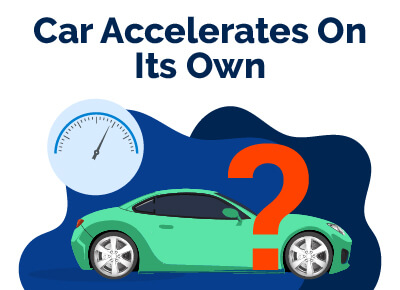Car Accelerates on Its Own (Causes and Fixes)
July 22, 2023


Chris is Head of Content for FindTheBestCarPrice and is based out of Philadelphia, PA. As a seasoned automotive industry analyst and car enthusiast, he ensures the highest level of quality across all our content and curates our picks for the best deals each month.
Chris studied information systems and marketing at Drexel University and writes about a wide range of topics ranging from car buying tips to troubleshooting common mechanical issues.
When he’s not thinking about cars, he likes to stay in with his dog and make an “attempt” to finish a crossword puzzle (he’s not quite at the Saturday/Sunday level…yet). As a former cheesemonger, Chris still has a “sharp” passion for all things cheese, and his fridge is always loaded with it!
Chris also has a passion for things that go fast, and drones are no exception. He spends some of his time writing for Dronesourced.
Automobiles constitute an exceedingly significant facet of our daily routine, serving as a means of commuting to work, traveling, or moving within our vicinity.
Nevertheless, irrespective of the vehicle's age or novelty, it must undergo the prescribed inspections to prevent malfunctions and ensure one's safety while on the road.
Among the prevalent predicaments plaguing cars and their engines, acceleration issues frequently arise due to idling or faulty accelerator regulation. But what does it mean when a car accelerates on its own?
To understand the reasons behind unanticipated acceleration and its remedies, continue reading this piece.
Table of Contents
Car Accelerates on Its Own: What Does It Mean?
Unintended acceleration denotes a malfunction that causes a vehicle to hasten inexplicably without driver intervention, which, in some instances, can lead to braking failure, rendering the situation beyond the driver's purview and potentially causing a road collision.
A faulty electronic system in a car can disrupt the powertrain control module, impeding the engine's proper functioning.
Newer vehicle models can be susceptible to unintended acceleration incidents, mainly when the throttle control mechanisms are defective, triggering abrupt acceleration. In contrast, the vehicle is in motion, even without accelerator input.
Aside from spontaneous acceleration, drivers may also face complications such as brake failure and difficulty restoring the vehicle to idle when already in gear.
Another frequent phenomenon is the loss of vehicular control in such a scenario.
Sudden unintended acceleration is an unexpected event that can transpire when engaging in braking, gear-shifting, or cruise control adjustments.
The abrupt alteration in the electrical current can lead to autonomous acceleration, wherein the car hastens without driver intervention.
Car Accelerates on Its Own: Causes and Fixes
The following are the most common causes of car acceleration on its own:
1. Failing Throttle Body
If your vehicle suddenly accelerates without input, it could be due to a malfunctioning throttle body.
The throttle plate in the body may stick and fail to return to the correct position, causing the car to accelerate independently.
How To Fix a Failing Throttle Body
To fix a failing throttle body, inspect it for any sticking or obstruction. If you find dirt or debris, clean it with an appropriate cleaner.
In extreme cases, you may need to replace the throttle body to prevent your car from suddenly speeding up on its own.
2. Idle Air Control Malfunction
The malfunctioning of the Idle Air Control (IAC) could be the underlying reason for an unintended acceleration of your vehicle.
The IAC actuator or idle air control valve, situated in fuel-injected automobiles, governs the rotational speed of the car engine during idling.
A similar mechanism, an idle speed control actuator, is employed in carbureted cars.
Furthermore, the IAC collaborates with the vehicle's Electronic Control Unit (ECU) to manage the engine's airflow to ensure smooth idling. If the IAC is defective, your car can exhibit an unexpected acceleration.
How to Fix a Malfunctioning Idle Air Control
To fix the issue, one must eliminate and clean the IAC to prevent the car from accelerating independently.
It is recommended to use carb cleaner to cleanse the inside of the IAC and remove any carbon deposits or gunk buildup.
3. Vacuum Leak
A vacuum leak might be the underlying cause of the issue. It can be easily identified by using a can of starting fluid.
Vacuum, in the context of automobiles, refers to the pressure disparity between the intake manifold and the surrounding air.
The differential pressure generates a suction force that facilitates air intake into the engine. A gasoline engine depends on a certain level of vacuum to operate efficiently.
If your car suffers from a vacuum leak, the engine will ingest more air than necessary, which upsets the air-fuel ratio required for optimal combustion.
This surplus air may lead to abnormal acceleration, stumbling, or sluggishness when you press the accelerator pedal.
4. The Accelerator Pedal Might be Sticking to the Floor Mat
Although not a principal reason for unintended acceleration, a pedal getting trapped on the floor mat can be possible.
In this scenario, a floor mat that is not securely placed could shift and wedge itself under the accelerator pedal or become entangled between the pedal and the central console.
Consequently, the pedal cannot be lifted, causing the vehicle to accelerate spontaneously.
How To Remedy This Issue
To remedy this, raise the floor mat and ensure it does not obstruct the pedal.
5. Dirty Mass Airflow Sensor
A contaminated mass airflow sensor may be the underlying cause of your car's automatic acceleration.
The sensor measures the magnitude of air entering the engine and transmits this information to the car's computer system.
However, when it becomes clogged with debris, it can result in an unstable condition and an uptick in fuel consumption. Toyota cars are renowned for fuel efficiency, even under low consumption.
How To Fix a Dirty Mass Airflow Sensor
Cleaning the mass airflow sensor is a possible solution to resolve this issue. However, severe cases may require a replacement to eliminate the problem altogether.
6. Falling Vacuum Hose
A vacuum hose failing or falling can cause unintended acceleration in fuel-injected vehicles. A vacuum hose is a pliable tube that carries vacuum energy throughout the automobile.
Its function is to sustain the correct pressure within the engine, allowing fuel, air, and spark to work together seamlessly. If the vacuum hose is defective, your car will accelerate unexpectedly.
Detecting a pinhole or leakage in a vacuum hose can be challenging. One of the probable components that could be at fault is the fly-by-wire speed sensors between the accelerator pedal and throttle position sensor.
What To Do If Your Car Accelerates on Its Own
This critical issue necessitates an immediate fix as it poses a significant risk of a catastrophic automobile accident. Follow these steps if your vehicle unexpectedly accelerates on its own:
1. Avoid Panic
Maintaining composure can prove daunting when confronted with a situation where your vehicle accelerates without your prompting, creating a potential hazard on the road.
Keeping a level head is essential to remove your vehicle from a busy thoroughfare safely.
Other motorists may exhibit hostility or restlessness, unaware that the malfunction lies within the automobile rather than the operator.
Since this issue can arise without warning, it is imperative that you promptly assess the cause to determine if it is something you can resolve independently.
2. Apply Brakes
The brake's promptness may be compromised in the event of abrupt and unexpected vehicle acceleration.
Nonetheless, as soon as you regain control, apply the brakes forcefully to leverage the vacuum power assist.
3. Shift to Neutral
One of the primary steps to take if your vehicle experiences unintended acceleration is to shift into neutral. By doing so, the transmission is disengaged from the engine, breaking the physical connection between them.
As a result, the engine no longer transmits power through the transmission to the wheels, effectively eliminating any potential acceleration.
4. Turn on the Hazard Lights
If your car experiences sudden acceleration and revving while driving on a quiet street, stopping may not cause much concern for traffic.
However, when such an issue arises on a highway, the situation becomes more challenging, with vehicles approaching from all directions.
Therefore, activating your hazard lights will signal other drivers that you are facing an issue, prompting them to give you space.
5. Apply Safety Measures
If unexpected acceleration occurs while driving on a highway, the situation can quickly become hazardous with vehicles approaching from all directions.
It is crucial to deploy a warning triangle to signal to other drivers that your vehicle is immobilized.
Moreover, donning a fluorescent jacket can increase visibility and draw attention. After placing the warning triangle, it is prudent to move away from the highway and request the services of a tow truck.
Best Car Deals by Category
Frequently Asked Questions
Why does my car suddenly accelerate on its own?
There can be several reasons for a car suddenly accelerating independently, including a malfunctioning mass airflow sensor, a failing vacuum hose, or a stuck accelerator pedal.
It's essential to have your vehicle inspected by a professional to determine the root cause of the issue.
What to do if my car suddenly accelerates when driving?
If your vehicle suddenly accelerates while you're driving, it's imperative that you remain composed and work towards restoring control of the automobile.
Shift to neutral, hit the brakes to maximize the vacuum power assist, and turn on your hazard lights to alert other drivers of the issue. If you're on a busy road, try to find a safe spot and call for help.
Can I fix a sudden acceleration issue myself?
Sometimes, you can fix a sudden acceleration issue, such as cleaning a dirty mass airflow sensor or checking for a loose vacuum hose.
However, it's essential to consult a professional mechanic for an accurate diagnosis and proper repairs to ensure your safety on the road.
Posted in Car Buying Tips, Car Troubleshooting |




